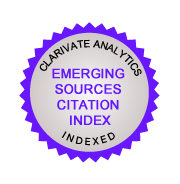Hate speech. Vanishing point of the hate sppeches
DOI:
https://doi.org/10.24215/16696581e795Keywords:
Semiotics, Hate Speech, Political Constitution, FascismAbstract
After the attempted murder of the Vice President of Argentina, the term «hate speech» was set up in the political arena and in the local media agenda as a key explanatory resource for the motives of the attack. In response to such an event, we use the polemical amplification of the treatment of the conditions and mechanisms involved in the disqualification of a prominent public figure, in order to more clearly distinguish the circuit of harassment that affects broad sectors of the population whose identities and needs remain invisible. Specifically, we take note of the experience of uncertainty, with the attached affects of anguish and fear, promoted by the contemporary precariousness of the conditions of existence, pointing out the oscillating and unstable state of those affects and the contingent slide that they allow towards hatred and violent enactment. We warn, in this vein, the risks that hate speech entails for the political constitution of life, especially insofar as its most extreme expression expels a radical hatred of speech, as the foundation of common understanding. In this context, in order to unravel the intricate set of enunciators and processes involved in the dissemination of hate speech, we believe that it is propitious to develop a psychosocial semiotic analysis in this regard, the direction in which we are advancing in this communication.
Downloads
References
Althusser, L. (1970). La ideología y los aparatos ideológicos del Estado. Freud y Lacan. UNLP. http://perio.unlp.edu.ar/teorias2/textos/m3/althusser.pdf
Angenot, M. (2010). El discurso social. Buenos Aires: Siglo XXI Editores.
Barthes, R. (2014). El placer del texto y Lección inaugural: De la cátedra de Semiología Literaria del Collège de France. Buenos Aires: Siglo XXI Editores.
Bauman, Z. (2004). Modernidad Líquida. Buenos Aires: Fondo de Cultura Económica de Argentina S. A.
Bleichmar, S. (1999). Entre la producción de subjetividad y la constitución del psiquismo. Revista del Ateneo de Psicoanalítico, (2), 1-12.
Bourdieu, P. (2001). Poder, derecho y clases sociales. Bilbao: Editorial Desclée De Brouwer S.A.
Entel, A. (2007). La ciudad y los miedos. La pasión restauradora. Buenos Aires: La Crujía.
Freud, S. (1991a). Psicopatología de la vida cotidiana. En J.L. Etcheverry (trad.), Obras Completas Sigmund Freud (vol.6, pp.1-306). Buenos Aires: Amorrortu.
Freud, S. (1991b). 23a Conferencia. Los caminos de la formación de síntoma. En J.L. Etcheverry (trad.), Obras Completas Sigmund Freud (vol.16, pp.326-343). Buenos Aires: Amorrortu.
Freud, S. (1992). Inhibición, síntoma y angustia. En J.L. Etcheverry (trad.), Obras Completas Sigmund Freud (vol.20, pp.71-164). Buenos Aires: Amorrortu.
Gans, H. J. (1995). The War Against the Poor. The Underclass and Antipoverty Policy. New York: Basic Books.
Goffman, E. (2006). Estigma: la identidad deteriorada. Buenos Aires: Amorrortu.
Greimas, A. J. y Fontanille, J. (2017). Semiótica de las pasiones. De los estados de cosas a los estados de ánimo. Ciudad de México: Siglo XXI Editores.
Hobbes, T. (2003). Leviatán o la materia, forma y poder de una república, eclesiástica y civil. Buenos Aires: Editorial Losada S.A.
Honneth, A. (1992). Integridad y desprecio. Motivos básicos de una concepción de la moral desde la teoría del reconocimiento. Isegoría (5) 78-92.
Hornstein, L. (2018). Ser psicoanalista hoy. Fundamentos de la práctica. Ciudad Autónoma de Buenos Aires: Paidós.
INADI (2013). Mapa nacional de la discriminación 2013: Segunda serie de estadísticas sobre discriminación en Argentina. Buenos Aires: INADI.
INADI (2019). Base Mapa Nacional de la Discriminación. https://www.argentina.gob.ar /sites/ default/files/2022/06/mapa_nacional_de_la_discriminacion.pdf
INDEC (2022a). Condiciones de vida. Incidencia de la pobreza y la indigencia en 31 aglomerados urbanos. Buenos Aires: INDEC.
INDEC (2022b). Trabajo e ingresos. Mercado de trabajo. Tasas e indicadores socioeconómicos (EPH). Buenos Aires: INDEC.
Kierkegaard, S. (1982). El concepto de la angustia. Madrid: Espasa-Calpe S. A.
LEDA (junio de 2021). Informe Discursos de Odio en Argentina. https://www.unsam.edu.ar /leda/docs/Informe-LEDA-1-Discursos-de-odio-en-Argentina-b.pdf
Lewkowicz, I. (2006). Pensar sin Estado. La subjetividad en la era de la fluidez. Buenos Aires: Paidós.
Rodríguez Amieva, J. M. (2022). Comunidad y Comunicación: Un encuentro posible entre Peirce y Spinoza. Cadernos Espinosanos (47)113-143.
Rodríguez Amieva, J. M. (2023). Formaciones y transformaciones semióticas. Una revisión crítica sobre la determinación discursiva del sujeto. Umbrales de la Comunicación (en prensa). FCH, UNSL. ISSN: 2618-5644.
Scribano, A. y Espoz, M. B. (2010). Negro de Mierda, geometrías corporales y situación colonial. Manuscrito para ser publicado en Ferreira, J. y Scribano, A. (Comps.) Corpos en concerto: difrenças, desigualdades e desconformidades. Recife: Editorial Universitaria de UFPE.
Sellars, A. (2016). Defining Hate Speech. Berkman Klein Center for Internet & Society (20), 1-32. https://papers.ssrn.com/sol3/papers.cfm?abstract _id= 2882244
Spinoza, B. (2004). Ética demostrada según el orden geométrico. Madrid: Biblioteca de Filosofía. Editora Nacional.
Spinoza, B. (2014). Tratado teológico-político. Tratado político. Traducción de María Isabel Flisfisch y Humberto Giannini. Barcelona: Gredos.
Suhamy, A. y Daval, A. (2016). Spinoza por las bestias. Ciudad Autónoma de Buenos Aires: cactus.
Tönnies, F. (2001). Community and Civil Society. United Kingdom, Cambridge: Cambridge University Press.
Vergara, G. y Seveso, E. (2014). ¿Qué ves cuando me ves? Percepciones y emociones sobre prácticas de denegación social en las ciudades de Córdoba y San Luis (Argentina). Aposta. Revista de Ciencias Sociales (61),1-38.
Verón, E. (1980). La semiosis social. Buenos Aires: Gedisa.
Verón, E. (1987). La palabra adversativa. En El discurso Político. Lenguajes y acontecimientos. Buenos Aires, Argentina: Hachette.
Weber, M. (1978). Economy and Society. An outline of interpretative sociology. California, United States of America: University of California Press.
Downloads
Published
How to Cite
Issue
Section
License
La aceptación de un original por parte de la revista implica la cesión no exclusiva de los derechos patrimoniales de los/as autores/as en favor del editor, quien permite la reutilización, luego de su edición (postprint), bajo una Licencia Creative Commons Atribución-NoComercial-CompartirIgual 4.0 Internacional (CC BY-NC-SA 4.0)
Acorde a estos términos, el material se puede compartir (copiar y redistribuir en cualquier medio o formato) y adaptar (remezclar, transformar y crear a partir del material otra obra), siempre que a) se cite la autoría y la fuente original de su publicación (revista y URL de la obra), b) no se use para fines comerciales y c) se mantengan los mismos términos de la licencia.
La cesión de derechos no exclusivos implica que luego de su edición (postprint) en Question las/os autoras/es pueden publicar su trabajo en cualquier idioma, medio y formato; en tales casos, se solicita que se consigne que el material fue publicado originalmente en esta revista.
Tal cesión supone, también, la autorización de los/as autores/as para que el trabajo sea cosechado por SEDICI, el repositorio institucional de la Universidad Nacional de La Plata, y sea difundido en las bases de datos que el equipo editorial considere adecuadas para incrementar la visibilidad de la publicación y de sus autores/as.
Asimismo, la revista incentiva a las/os autoras/es para que luego de su publicación en Question depositen sus producciones en otros repositorios institucionales y temáticos, bajo el principio de que ofrecer a la sociedad la producción científica y académica sin restricciones contribuye a un mayor intercambio del conocimiento global.
















































